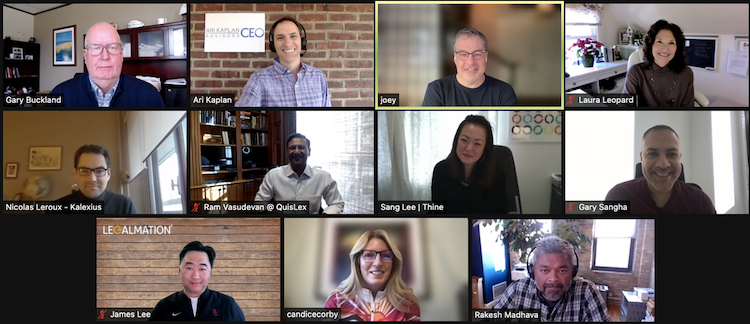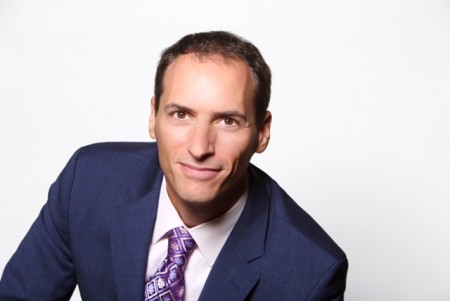CEO roundtable with Ari Kaplan: Trends, challenges and opportunities in 2021 and the year ahead

Ari Kaplan talks with his 2021 CEO roundtable.
Ari Kaplan recently moderated a discussion with the following chief executive officers for the final Ari Kaplan Advisors CEO Roundtable of 2021 about trends, challenges and opportunities in the past year and the year ahead.
- Gary Buckland, CEO of Lexitas
- Candice Hunter Corby, CEO of Cobra Legal Solutions
- Sang Lee, CEO of Thine
- James Lee, CEO of LegalMation
- Laura Leopard, CEO of Leopard Solutions
- Nicolas Leroux, CEO of Kalexius
- Rakesh Madhava, CEO of Nextpoint
- Gary Sangha, CEO of LexCheck
- Joey Seeber, CEO of Level Legal
- Ram Vasudevan, CEO of QuisLex
Ari Kaplan: Where have you discovered an opportunity for your business in 2021?
Gary Sangha: The stereotype and cliche that legal professionals are very late adopters of tech has generally proven to be true, but that has changed. I’ve been pleasantly surprised at the willingness to be early adopters and try out new tools. The venture landscape obviously bears this out, and the attitude towards being early adopters to legal innovation has really changed for the better.
Gary Buckland: We have over 1,000 employees, and we were a 100% facility-based organization prior to the pandemic. We’ve had to pivot not only for our employees but for our customers, as well. Attorneys were concerned about, and rightfully so, somebody influencing a witness during a deposition, but the best thing to come out of 2020 and 2021 for us was the adoption of remote depositions. Educating the client base on all of the great technologies out there not only helps clients become more efficient, but it has helped us become a much more efficiently run company.
Laura Leopard: Decisions are being made, and technology is being adopted more quickly, but many companies would not have made some of the decisions to do so it wasn’t for COVID. The pandemic took a lot of the reluctance out of some decisions to move forward and pushed the timeline up, probably by a decade.
 Ari Kaplan. Photo by Lauren Hillary.
Ari Kaplan. Photo by Lauren Hillary.
James Lee: COVID brings challenges in trying to find new clients at conferences and other ways that require travel. What we found is that the clients that we already have offer tremendous land and expand opportunities. The idea of working hand in hand with your current clients and expanding that relationship is a big opportunity for us for 2022. And, for us, the adoption period for software is actually very long. We target the insurance industry, and the sales cycle there could be as long as two years. But the benefit there is that because the sales cycle is so long, there’s a competitive advantage that we have.
Nicolas Leroux: Working with remote technology has been possible for years, but the pandemic showed people that we can all do things differently. ALSPs are increasingly acceptable and actually sought after by large corporations that want to understand their options. Recently, we’ve won projects that would have gone to law firms two years ago. The client would not have even considered going to an ALSP.
Candice Hunter Corby: We have actually increased productivity and outreach. We are embracing technology and a different form of outreach.
Ram Vasudevan: You still need to make the sale, and clients must realize the benefits, but there is more flexibility and openness than there was previously. There used to be an erroneous correlation between talent and geography. If you had work in a certain city, you needed talent to be in that location, but now, as long as you’re able to execute flawlessly using technology, process and knowledge, it doesn’t matter where an individual sits.
Ari Kaplan: Are there specific yet different skills you are looking for now?
Gary Sangha: Empathy really matters because in-person sales are just so much easier. When everyone is in the room, you can get a sense of their impressions. Empathy by Zoom is hard, and getting buy-in is challenging.
Sang Lee: Right now, the opportunity exists to think about technology—not as something that will simply make things more efficient and save time or money but as something to create possibilities for improved human connection. The Great Resignation has been a profound gut punch for many employers, who must now try to figure out how to use technology to make the lives of the people who work for them better. This is a real pivot for those who have viewed technology as a way to universalize or level set or genericize processes. Instead, employers must deploy technology and leverage management skills with an eye to being more humanity-oriented because advancing humanity is a critical 2022 goal.
Rakesh Madhava: We now equate the term technology with cloud. There is a much more human-centered approach around workflows and user experience. Cybersecurity, compliance and adapting to an heightened regulatory environment have all become top-tier issues and will be the first items that people will want to address.
Joey Seeber: The advancements in technology that have made us more efficient and helped us serve our clients and customers better, combined with the remote nature of our work, have also caused us all to become detached. As a result, the value of the human has increased. People are interested in not just how we work but who we are as humans that work in the law. We have found one of the biggest impacts of COVID for us is the ability to find talent that we would have been geographically unable to do before. We can go out and find the very best in whatever we need now, and they get work from wherever they want to work, and those human characteristics are even more important.
Laura Leopard: COVID has made me a much better boss and has increased my empathy level in very simple ways. We were a remote company for many years and always used Zoom or similar technology but never turned our cameras on. Now, everyone’s camera is on in every meeting, and we see a different side of our team than we did before. It has enriched the whole experience for me. I feel like I know everyone so much better. It is possible to really create a human connection in this way.
Gary Buckland: I’ve developed my soft skills over the last couple of years because of the need for empathy and the realization that people are working outside of their comfort zones.
Ari Kaplan: What challenges do you still see in 2022, and how do you think organizations can overcome them?
James Lee: You can’t ignore that we now have a very mobile workforce. We are trying to find where can we source good talent and have been taking advantage of the H-1B market. There are a lot of fantastic foreign-born candidates and am surprised that more companies don’t rely on this candidate pool for talent. I think you have to be somewhat flexible in hiring the type of candidate you want. Also, much of what we do is experimentation and innovation, which I don’t think you can just do alone in a room with teams scattered around the country. There’s a lot of value in brainstorming together in a conference room with a whiteboard and identifying permutations of options that could lead to some sort of discovery. I think that’s been somewhat stunted. Another big challenge for us is trying to determine who has the climbing boots in an organization that you need to ally with and who are the blockers. Trying to figure out that “Game of Thrones” aspect of every organization that you face is really important at the end of the day, so 2022 is still going to be very challenging for all of us.
Nicolas Leroux: It’s a matter of balance. We can do it all remotely, but for some activities, we still need to meet in person. Younger, junior professionals often don’t have the optimal circumstances at home to work in a productive environment. They need to meet people, make friends and develop their careers. In terms of sales, usually, the most important tidbit of information comes at the end of the meeting, even walking to the elevator. Once a relationship is established, remote engagement works, but to really get the relationship going or move past the finish line, you need to meet people in person.
Joey Seeber: The overarching challenge for 2022 will be continued uncertainty. We just don’t know what will happen. Everyone wants to get back, but success will come through flexibility. We would like to be in person but will need to continually adjust.
Rakesh Madhava: There does seem to be an impending crisis in professional development, particularly of our more junior members. Those earlier their careers are missing out on years of opportunities.
Ari Kaplan: How are you all navigating client expectations in this environment?
Joey Seeber: Clients expect that much, if not all, of the work is going to be done remotely through distributed teams, and we’ve jumped over that hurdle. In terms of expectations going forward, there’s good news in that everybody has learned to be more understanding and flexible. Meeting client expectations requires a recognition that you need to keep all of your options open.
Candice Hunter Corby: We are hiring a lot of project managers both on the tech side and on the managed review side. Some of our larger clients actually want to meet the candidates, whether it’s virtual or in person. Pre-pandemic, we assigned an individual to a project, but we are much more open and transparent with our clients throughout the process.
Nicolas Leroux: I don’t really see COVID being an obstacle or creating any difficulties in the delivery of services.
Ari Kaplan: Do you expect to travel more or less next year?
Laura Leopard: We have signed up for numerous conferences, but we will not know until the time comes if they will be in person given all of the cancellations and adjustments in 2021.
Sang Lee: I really hope that I am on the road more. Every time I was on the road in the last six months, it was extraordinary. People are so happy to see each other and eager to brainstorm.
Ari Kaplan: Are people tentative about new initiatives for 2022?
Ram Vasudevan: When you already have experience, it is easy to draw down on it, but someone in the first five or 10 years of their career working remotely full time can be in danger of becoming more of a gig worker. It is viable in the short term, but is not sustainable over the long term. That’s the biggest challenge that the pandemic has presented, and it will continue in 2022. We have become more fearful, rightfully so, and perhaps more cautious, but I worry about the impact on our younger generations who may need to spend four or five years continuously wearing a mask or being reluctant to shake hands or hug someone. I’m not sure of long-term consequences on society and business. You build so much moral character by meeting in person with peers and senior leaders, which is difficult to do entirely online.
Listen to the complete interview at Reinventing Professionals.
Ari Kaplan regularly interviews leaders in the legal industry and in the broader professional services community to share perspective, highlight transformative change and introduce new technology at his blog and on iTunes.
This column reflects the opinions of the author and not necessarily the views of the ABA Journal—or the American Bar Association.



